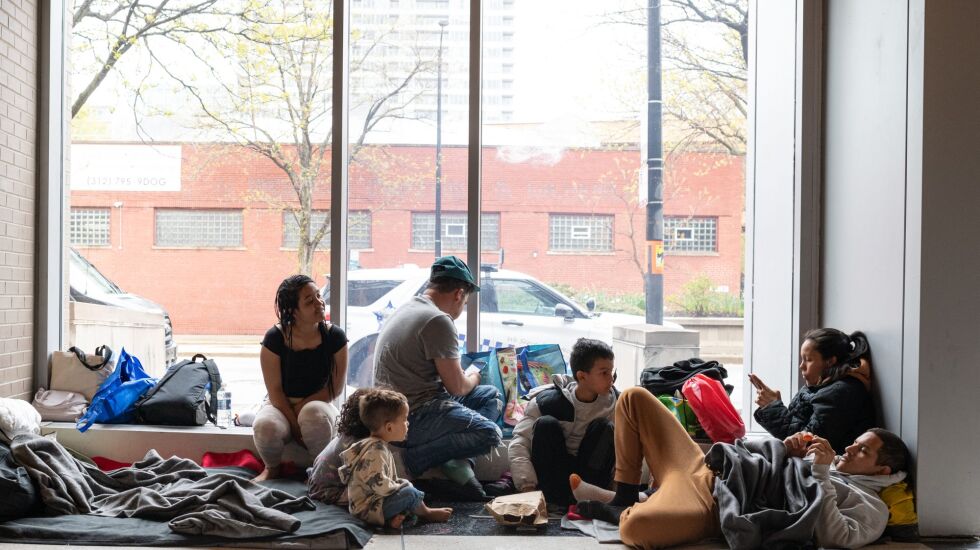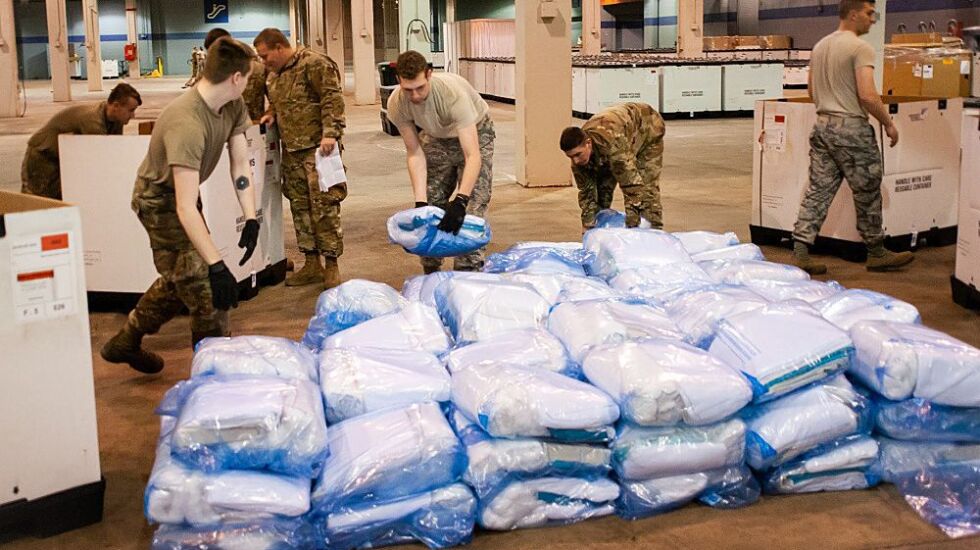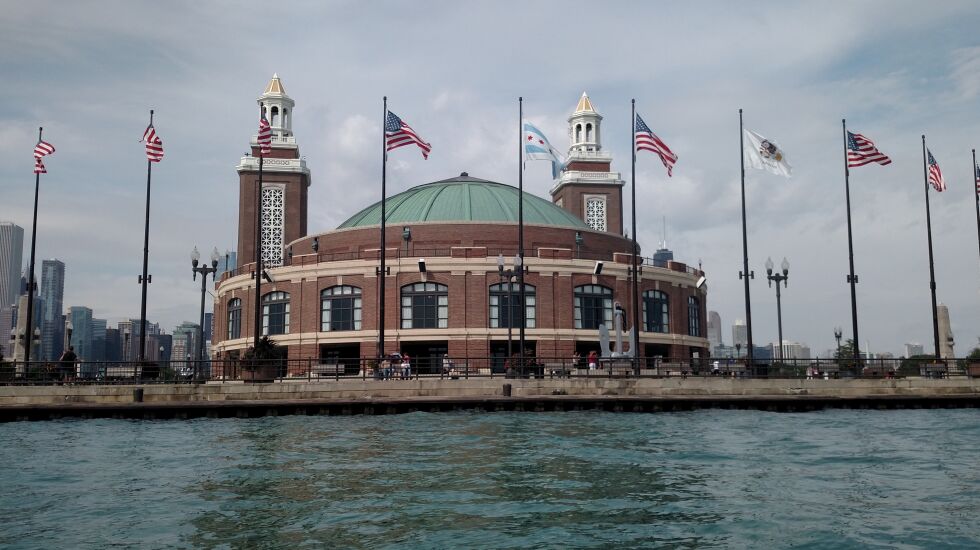
McCormick Place, Navy Pier or shuttered big-box stores should be used to house asylum seekers descending on Chicago, instead of “playing whack-a-mole” and inconveniencing multiple Chicago neighborhoods, an influential alderperson said this week.
“We need central locations. We need large spaces. We could better utilize our staffing time if we knew we had a large space,” said Ald. Maria Hadden, whose 49th Ward on the Far North Side lakefront is home to Leone Beach House, a Chicago Park District facility that has been used to house single male asylum-seekers off and on since last fall.
The beach house, 1222 W. Touhy Ave., was reopened last week as a “respite center,” where families with children are waiting for permanent placement.
“McCormick Place has lots of different facilities. If we had a large space that could accommodate like thousands of people, then we wouldn’t have to spend as much time kind of playing whack-a-mole on a bunch of smaller facilities, which both costs a lot of time and energy that runs into stepping on the toes in communities where, maybe, they don’t have time to ask for permission or do a real engagement process.”
Hadden pointed to what she called the “constant balance” between “the burden that Chicago neighborhoods versus downtown have to absorb.”
“There’s a reason that McCormick Place was stood up and put together as a COVID response place. Because from a logistics and emergency management perspective, it just would be ideal. ... And if it’s not McCormick, then some other big-box space where it’s a large facility where we can really bring more people and more resources to one or two locations as opposed to trying to manage a dozen,” she said.
Situation dire, Council members told
At a joint City Council committee hearing last week, alderpersons were told Chicago is out of money, space and time to handle the “humanitarian crisis” caused by asylum-seekers descending on Chicago with 40,000 people waiting at the border and a surge that has yet to peak.
The calamity is so dire — with young families sleeping on the floors of police stations and “walk-ins” alone rising from 10 to 125 a day — alderpersons will need to start making “hard decisions” that may include taking Chicago Park District facilities offline even as summer recreation season approaches to serve as emergency shelters for asylum-seekers.
With “zero dollars” from the federal government for 2023 costs and a $53 million shortfall to meet the surge through June, Budget Director Susie Park said the Council will soon be asked to approve a “mid-year budget amendment” that applies portions of a nearly $700 million surplus to plug the gap.
Matthew Doughtie, manager of emergency management services for the city’s Office of Emergency Management and Communications, told alderpersons 13 options have been identified as additional shelter locations, “none of them great. … Each of them comes at a cost, be they financial personal or political cost. But, they’re options nonetheless.”
McCormick Place, Navy Pier should be on table, Hadden says
Hadden said she expects that report next week. She can only hope OEMC thinks big enough to include McCormick Place and Navy Pier.
Sure, those facilities are booked for conventions and meetings, particularly during spring, summer and fall. But, she noted, not all of McCormick Place is booked all the time, mentioning McCormick Place East and the Arie Crown Theater specifically.
“What are some of these spaces that may not be utilized or fully utilized that we could put online again? It would be preferable and better for the city to manage,” said Hadden, one of Mayor-elect Brandon Johnson’s closest City Council allies.
“We’ve got Walmarts that are closed. They’re on the table. I’ve heard conversations about other larger retail spaces that are closed that maybe we can use. ... But for me, the priority is, what’s the space we can get that can help us move people out of the police stations? That’s first. There’s 33 people at the [Rogers Park] district police station today. … The district lobby is pretty much impassable.”

Officials at McCormick Place, however, said the venue is too busy to serve as a shelter.
The space lacks some needed amenities, such as showers, said Cynthia McCafferty, a convention center spokeswoman. More than 600,000 people attended 39 events there in the first three months of the year, and this month the Lakeside Center will only be empty only six days, she said.
“We feel for the families and the people who are involved,” McCafferty said. “However, we have an obligation to our customers that have signed contracts for the space.”
And while it is true McCormick Place was turned into an emergency hospital during the pandemic, McCafferty said that was possible only because the convention center was closed during the statewide lockdown.
State, federal help could be on the way, Johnson adviser says
On the other hand, Jason Lee, a senior adviser to Johnson’s transition team, said Hadden’s proposal to use McCormick Place, Navy Pier or shuttered big-box stores “makes a lot of sense.”
“If we had a large facility, we could engage whatever community was around that facility, explain to them how we’re going to operate it. And that would put less pressure on trying to deal with all of these different contingencies in different neighborhoods when there’s not time to run through a full process and give them the information they need, which exacerbates tensions. Which is kind of what some people want to see. They want to see us divided against ourselves,” Lee told the Chicago Sun-Times.
“We, as leaders of the city of Chicago, have to show that it’s possible to be a welcoming city without furthering acrimony and discontent.”

With talks continuing with the state and federal governments, there “could be incremental resources coming from” either or both that would “allow us to potentially create something like Alderwoman Hadden is talking about,” Lee told the Sun-Times.
“You have to make sure that you do it right. You cannot create a situation where people are not being taken care of or there’s not enough structure or there’s not enough staffing. And then, obviously, you’ve got to think about whatever other consequences that might have to that facility. We generate revenue from events that occur. Those are all things that have to be evaluated,” he said.
“I’m old enough to remember, not necessarily Chicago, but around the country where we’ve tried to house people in large facilities. There’s been moments where it worked really well. And there have been moments when it worked less well. When you do it, you just want to make sure you have the resources, staffing, organization and processes to make it as positive an experience as it can be. You don’t want to do something that becomes frankly an abomination, so to speak, which we’ve seen in some crisis scenarios. I don’t anticipate that would happen here. But we want to make sure we do everything possible to make it work.”
Roughly 130 people — families with children — waiting for permanent placement, are staying at Leone Beach House respite center, Hadden said. She defined a “respite center” as having chairs, washrooms, food and staff — but no beds. It’s “not set up for long-term stays,” she said.
“There’s no tension. People aren’t upset. It is a field house that’s not typically used for active programming. So it’s not like programming has to be moved in order for it to be utilized, which is why it’s been a frequent space for the city to come back to,” Hadden said.
“We will run into some challenges as we get past Memorial Day into lifeguard season because it is where there is storage for a lot of our lifeguard equipment and locker rooms for our lifeguards to use. But the active field house, where all of the programs happen, isn’t far away. The plan is, if needed, equipment and access for the lifeguards could move to that location.”
Park District summer programs disrupted
The Chicago Park District confirmed programming at Brands Park, 3259 N. Elston Ave., will move to make room for asylum-seekers as it becomes a respite center.
Christy Clow, 47, of Avondale, said she snagged three coveted slots for summer programming at Brands. She was told her children will be guaranteed a spot at another location, though as of Thursday morning, she hadn’t been officially told where.
She would have considered programs at different parks had she known Brands could be turned into a respite center. Still, Clow said she understands the city faces a dire situation.
“Obviously, I’m sorry for my kids because I know how much they really love Brands, but we are far more concerned with these migrants,” Clow said. “We are really mostly looking to figure out how we can sort of help them and make this transition better for them, and make sure they know they are welcomed here.”
Mike Healy, of Avondale, said his 7-year-old daughter was registered for a summer program at Brands, and he also hadn’t heard where they will go instead. Like Clow, Healy understood the decision to turn the park into a respite center.
“The inconvenience is absolutely nothing compared to bringing your family from your home to the U.S., and then being sent from Texas to Chicago,” Healy said. “They are just not even anything on the same scale.”
Healy said he plans to start collecting donations for people who end up at Brands at his business, Guild Row, 3130 N. Rockwell St. in Avondale.
Elvia Malagón’s reporting on social justice and income inequality is made possible by a grant from The Chicago Community Trust.







